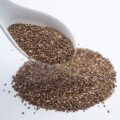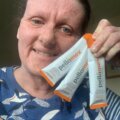There are quite a few vitamins and minerals that are vital for maintaining healthy happy skin and Vitamin D is just one of them. Vitamin E, Zinc, Calcium, Selenium and Vitamin C are also great for skin, but we’ll talk about those another time.
Vitamin D also helps regulate the absorption of calcium in the body so it plays a vital role.

Vitamin D2 vs D3
You might assume that all Vitamin D supplements are the same, but you’d be wrong. You need to get a good quality Vitamin D3 supplement, not D2.
A study by Robert Heaney of Creighton University in Nebraska and published in The Journal of Clinical endocrinology and metabolism, found that vitamin D3 is 87% more potent, and therefore more effective than D2.
We get different levels of vitamin D intake in summer and winter so supplements when there is less sun is really good idea. Read ‘Vitamin D Deficiency in medical patients in summer and winter’ on the PubMed website.
Which brands of supplements are best?
Don’t just get the cheapest own brand Vitamin D supplement. Look for those that are allergen free and have a good reputation. I am currently using Solgar Vitamin D.
Other quality brands include:
Vitamin D and the link to allergies
Yet another interesting report in February this year in the Journal of Allergy and Clinical Immunology found that “Low vitamin D levels linked to infant food allergy”. Could we conclude here that adults too might improve their allergy symptoms by taking vitamin D?
This study, “Vitamin D in Atopic Dermatitis, Asthma and Allergic Diseases” suggests this might indeed be the case.
Where else can you get Vitamin D into your diet?
What we all want to know though is how to get the most vitamin D into our diets naturally.
- The sun! – First of all, make sure you get some exposure to the sun every day. 20 minutes at least and that means without any sunscreen. Obviously, you should always wear sunscreen if you’re going to be in the sun for longer but for the skin to get the most benefit, let your skin feel the sun’s warmth without protection for a short time.
- Shitake and button mushrooms
- Oily fish such as mackerel, wild salmon, herring, sardines, catfish and tuna fish
- Oysters
- Cod liver oil and other fish liver oil supplements
- Free range and organic eggs, particularly the yolk
- Fortified fat spreads
- Fortified breakfast cereals like wheat bran flakes and oatmeal
- Dairy free milk such as oat and rice milk
- Liver and beef
- Cheese, milk and yogurt
- Fortified Orange juice
How much Vitamin D do we need in our diets?
And finally, how do you know how much vitamin D you need? It’s not the same for everyone.
The recommended daily does for a healthy human from age 1 to adult is 10mg a day, according to the NHS.
This article from Natural News might help you get a better understanding of how much you need in your diet. It goes into quite a bit of detail and I’m still not 100% sure but it is interesting in this debate.
It depends on your circumstances, whether you are deficient in vitamin D, how much sun exposure you get, the colour of your skin etc.
Can you have too much Vitamin D?
You can overdose and become ill if you take too much Vitamin D so follow the guidelines on any supplements and don’t take more than the recommended daily dose. Taking too much can have serious health implications including Nausea, sickness, feeling very thirsty and dehydrated, needing to pee more often, decreased appetite, sudden weight loss, muscle weakness, constipation and more!
Vitamin D3 is great for eczema, psoriasis, allergies and asthma
I think vitamin D3 could help anyone with eczema, psoriasis, allergies and asthma. It certainly can’t do any harm in the correct dose. Look at your diet and eat plenty of vitamin D rich foods, get as much sunlight exposure as you can, with protection and take a supplement in winter.
Do you take a vitamin D supplement? If you do, check it’s Vitamin D3 and not D2 which seems to be less effective, though I’m sure still does some good. But if just says Vitamin D on the label it may well be D2 and not D3.
I hope you found this blog helpful. Please comment below if you have anything to add or have found Vitamin D helped your eczema, asthma or allergies.












I am allergic to D except from the Sun. D is added to all cows milk and alternative nut milks. The public has been warned against ingesting so much D, which is toxic when overdosed, yet you are pushing it. Whats up with that? 15-20 or more of natural sunlight everyday is all it takes and its FREE.
Thanks for your comment. I’ve never heard of an allergy to vitamin D, except from the sun. Very interesting. I also didn’t know vitamin D was toxic when overdoses. Am I pushing people to overdose on Vitamin D? I hope not. This blog is just my hobby, my way of helping people with allergies and eczema just a little bit if I can. It certainly wasn’t my intention to give any dangerous advice.
I struggled to find a definitive level which was recommended so when I do I’ll update this post, but it depends on where you live, how sunny it is, whether you are already deficient… surely? Where I live, in England, the weather is not sunny that often. When it is I grab some free vit D every time but I’m not sure you get som much benefit on cloudy, raining and winter days. I agree though that 15-20 mins of sun is recommended, I think I’ve said this above? Anyway thanks for your comment. I’ll check out vitamin D allergy and toxicity due to overdose.
What if you cant get enough sunlight???? I was ill 7 times every five years all winter long
until I started taking D3 Summer is a great time for getting the sun so what do you do for the rest of the year??
Why are we always having to read posts from those that refuse to read and learn and have common sense?
Right, so you read the title of the blog post then? I think we both agree vitamin D3 is a good thing, I take it too.
Vitamin D3 capsules taken in the winter reversed my severe eczema flare up which would not respond to anything even steroids! I had my levels tested and was waaaay below, I mean it’s almost none existent! Needless to say my eczema is better in the summer.
I know take a maintenance dose of 2,000IU daily and my eczema is under control, only kicking off again when I slack. As for toxicity you’d have to take absolute tons, I read about it before deciding on a maintenance dose.
Good article.